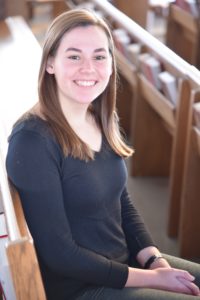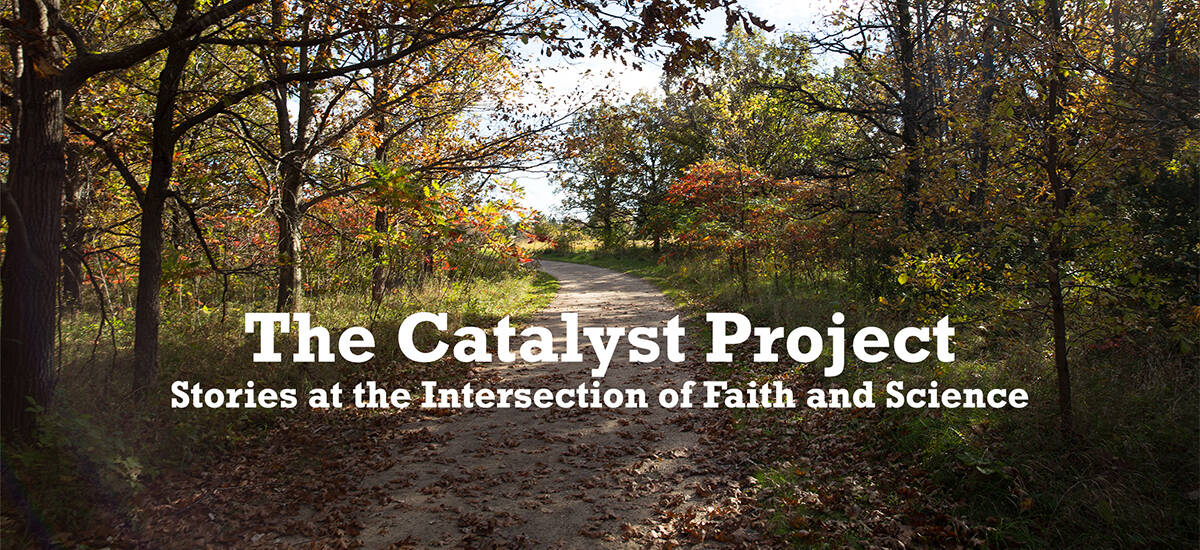
Growing up, Leah Johnson had a wide variety of interests. However, she didn’t find her true scientific interest until taking biology and chemistry in high school. “I realized how much I enjoyed learning about how living systems function,” she reflected. From there, science classes at Gustavus “helped me to solidify and narrow down my scientific interests.” Leah hopes to use her interest in science to become a hospital pharmacist, as “a desire to help the sick made [her] most interested in working in a clinical setting.” She hopes to work with children, and would love to take part in science writing or journalism as a side job if the opportunity arises.
Leah is a gifted and hardworking student, and “has a gift for caring for people and animals.” She also is a musician, playing piano and violin. She enjoys singing and performing hymns and religious pieces, “especially around the church holidays.” Leah says that “a teacher used to tell me that ‘singing is praying twice’, and I like making music as a way to connect to my faith whenever I have the opportunity.” Leah’s mom has served as an influential person in her life, encouraging her to pursue her passions and talents. Her mom has “taught [her] the importance of hard work and acting as Jesus would.” Throughout Leah’s learning journey so far, “hers has been an important perspective as I contemplate various scientific, religious, and social issues”.
Leah believes “strongly in the value of hard work and the importance of caring for the environment”. She also believes in an omnipresent God and the love of his Son. Leah believes she can “best practice [her] faith by loving and welcoming all as equals, just as Jesus did.” She feels that vocation and faith are interwoven, and seeks to serve God through living into her vocation with hard work and continual self-improvement. Within the biological realm, Leah thinks that the scientific method and evolution are commonly held beliefs, and that there seems to be “a lot of variation” as far as religious beliefs.
As both a scientist and a citizen of the earth, Leah finds “denying the scientific consensus that backs anthropogenic climate change and using the story of Creation to justify our reckless use of the planet and its resources” to be dangerous and scary. She thinks that the religious rhetoric of human dominion over all of life is problematic, and believes that humans are to care for the earth and all creatures rather than consider ourselves the “all-important rulers of the planet.” She also feels that “if we are indeed meant to play this role [of rulers of the planet], it’s even more important to take care of the earth, for the sake of all people and animals.” Additionally, Leah finds it scary when people utilize scripture to justify “bigotry and hatred toward others, or preach Christian beliefs while not behaving as Jesus would—with love.” She also finds it problematic when science has been used to further harmful messages and movements, such as the eugenics movement. “Science concerns itself with learning about people and the world, often with the ultimate intent to help society,” Leah says, and she hopes that this objective will no longer be perverted to hurt people.
When it comes to the juxtaposition of religious faith and science, Leah finds it concerning that some people feel that science and faith cannot coexist or meld together in any way. Leah says that faith and science “can complement each other in my eyes.” Additionally, keeping religion and science and the people involved in either field in conflict “can exclude people from showing interest in both, and it discourages deeper discussion about the world, how it was shaped, and how it works.”
Leah’s faith has changed as she has grown older and continued to pursue science. She now believes more strongly in “the importance of questioning, both in the context of science and religion.” Leah finds that asking questions is central to the scientific discipline, and that any scientific pursuit is expanded through asking questions. Additionally, she doesn’t think that asking questions and modifying one’s beliefs “makes you a bad Christian.” Rather, she feels that “the act of questioning your faith shows that you truly care about it, because you want to examine it and make it personal to you instead of just blindly accepting a set of denominational beliefs.” For Leah, asking questions about and modifying her faith is an ongoing process of building her relationship with God. Asking these questions has also informed her pursuit of scientific advances.
Leah’s faith has made her “more appreciative of the beauty of the world around us”. Additionally, her faith has given her a purpose to work hard in studying science, so that she can “honor God by achieving the full potential He gave me.” Leah seeks to fulfill her scientific vocation and honor God through entering into a profession where she will directly help the sick.
